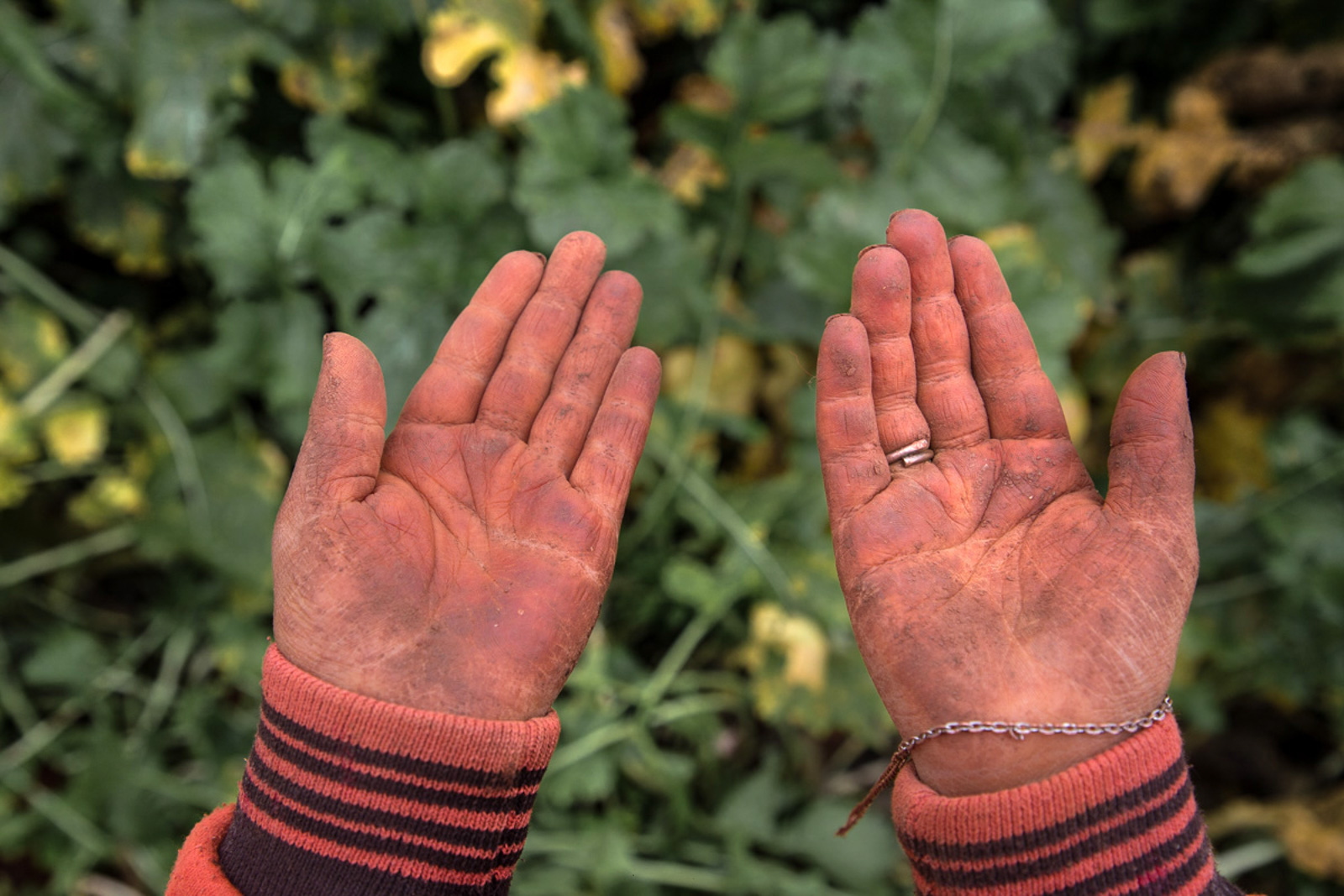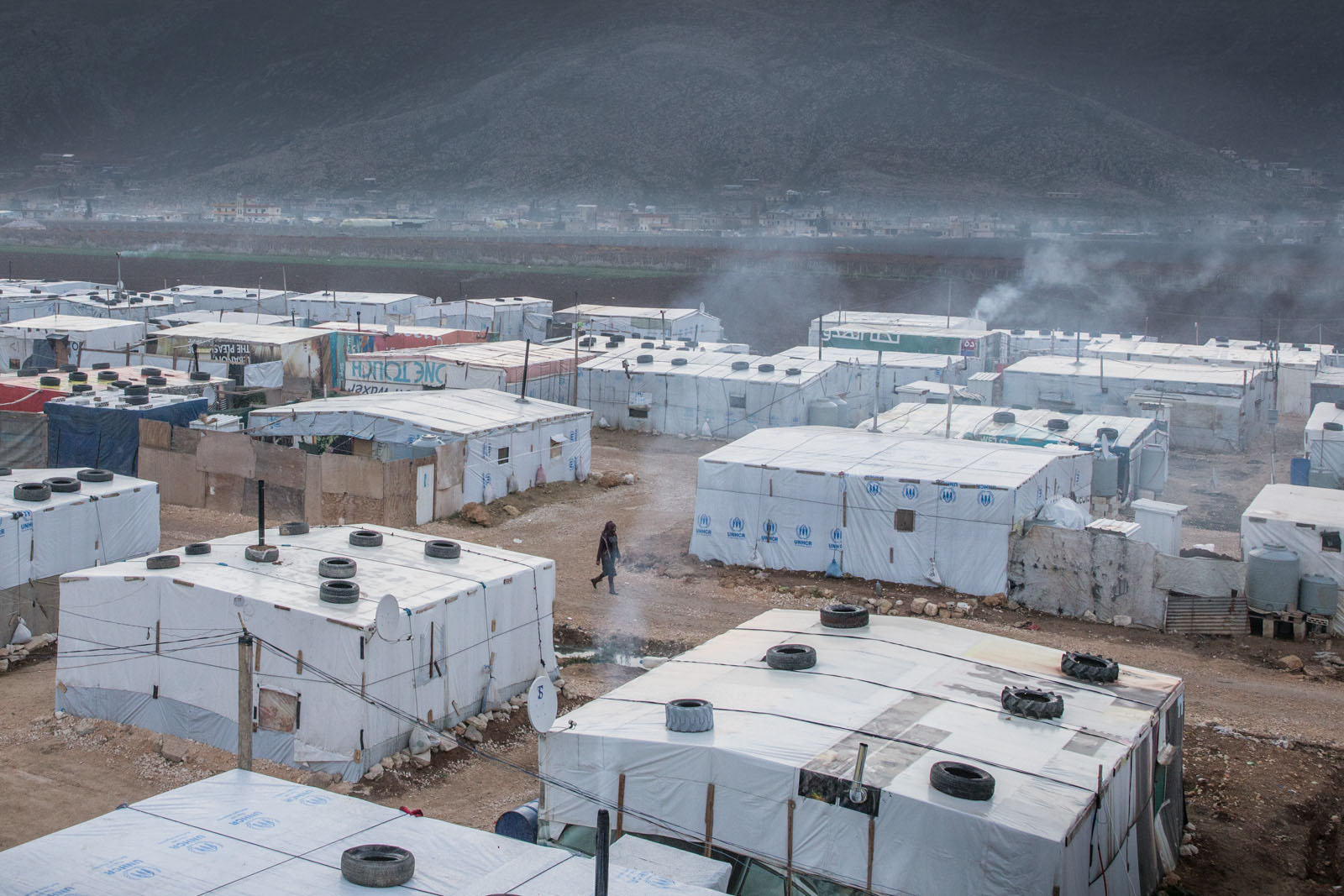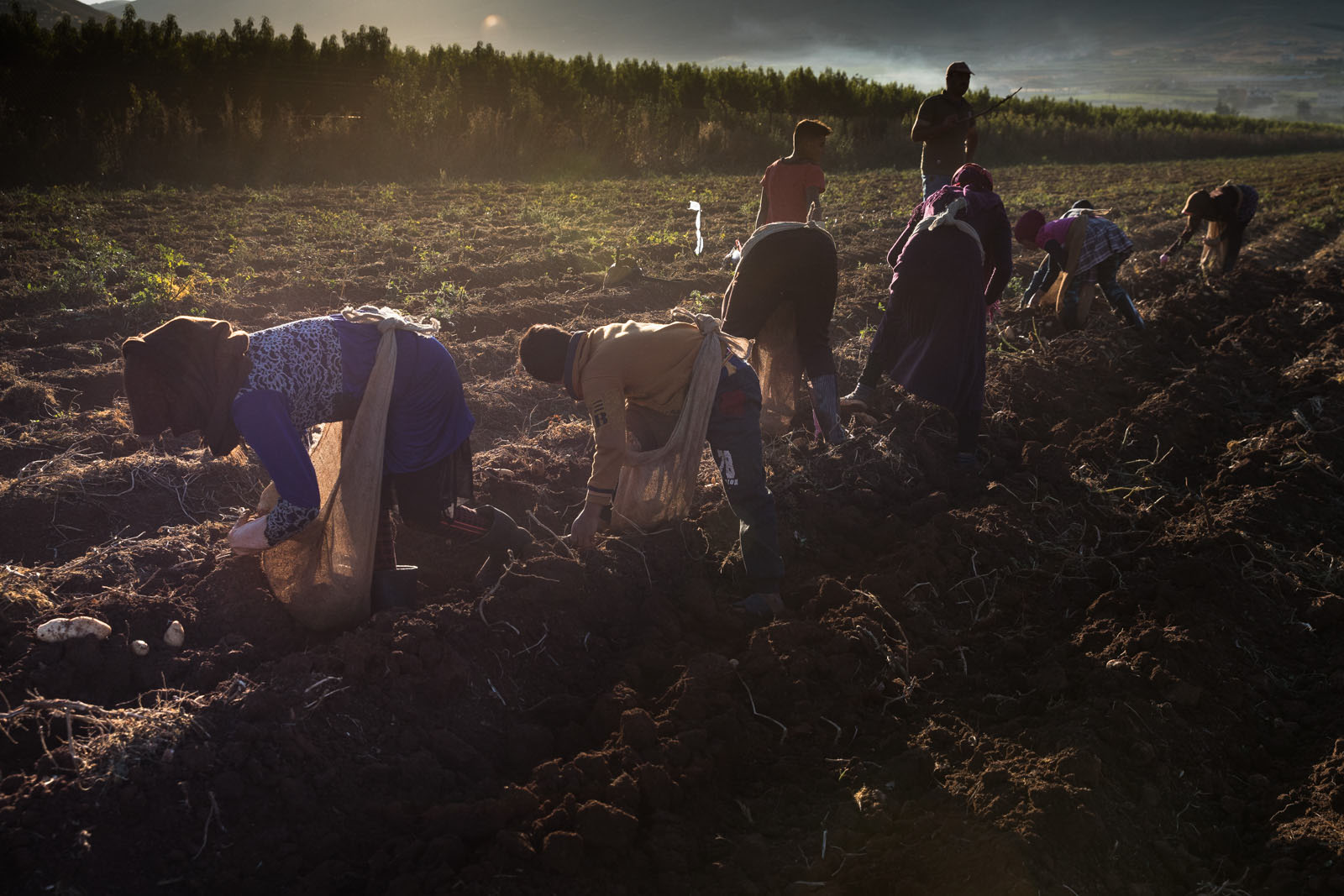Among camps and open fields

Every summer morning at dawn, Um Mahmoud gets ready to start her day in the fields. She wakes up to the sound of the call to prayer, prays and prepares her breakfast and some food to bring to work. Her hat and ghazala, a long tool used for harvesting, hang on the door of the tent where she lives with her children and grandchildren, in a refugee camp in Lebanon’s Bekaa Valley. As she is ready to leave, she takes down the hat, rests one hand on her waist and takes the ghazala with the other hand. She then heads to the entrance of the camp where other women are waiting for the shawish, the person in charge of the camp, to take them to the fields.
Um Mahmoud doesn’t speak much, only the bare essentials. But her voice can be heard all day in the fields, as she sings old Shami (from Damascus/Syria) songs to pass the time and, as she says, “enjoy herself”.
Issam, who owns the land where the women work, watches over her as she sings.
“I’m 40 years old and it has been 40 years now that I hear her sing in the fields,” he says.
Um Mahmoud is in her sixties, yet stiff and strong and, according to the other women, works like no others. Her work, they say, is “clean and fast”. And due to her long experience in the fields, she needs no instructions.
“I’ve been working in this valley for 60 years.”
“I’ve been working in this valley for 60 years,” she says, as she puts the straw hat on her head and walks into the fields to start the day’s work.
Um Mahmoud is far from the only woman working in the fields. From afar, masses of big moving straw hats can be spotted, half hidden between green beans and zucchini plants. Big groups of Syrian women harvest the Bekaa plains daily, from early dawn to sunset. Most work days remain the same, it is only the products to be harvested that differ.

In history
It was in the late sixties and early seventies that Syrian workers began coming to the Bekaa Valley in large numbers. A system was established where men, women and entire families came to stay for months in camps near the fields and work with planting and harvesting. As a result of economic differences between the two countries, Syrian labour was much cheaper for landowners in Lebanon, and the agricultural labour migration increased. The camps in the valley were only temporary at this point, and workers returned to Syria at the end of each season. Given that Lebanon’s agricultural season is mainly in summer and many of Syria’s crops are harvested in winter, it was a natural way of working.
The number of Syrian workers increased in the late eighties and early nineties.
The situation changed in the late eighties and early nineties, much due to the financial crisis in Lebanon at the time, leading the Lebanese pound to lose much of its value. The number of Syrian workers increased, and many began doing construction work as well as agricultural labour. At this time, Lebanese families also moved from the countryside to the city (most of all Beirut) in large numbers which led to a significant deficiency in the rural workforce. Syrian workers, working for very low wages, were able to replace them. And even if the money they earned was little, it would still meet their families’ basic needs of medical services, food and clothes, since prices in Syria were lower than in Lebanon.
Today, almost ten years after the onset of the war in Syria, the situation is no longer the same. As considerable numbers of Syrians have taken shelter in Lebanon from the fighting, camps that used to be seasonal have become permanent. The economic situation of the Syrian families changed completely: they have had to adapt to Lebanese living costs, which are much higher than those in Syria, and wages are no longer enough.
Syrian refugee women have since the war become an integral part of Lebanese agriculture.
Syrian refugee women have since then become an integral part of Lebanese agriculture. They are now the main pillar of the workforce: a recent survey on child labour in the Bekaa Valley conducted by the American University of Beirut shows that 55 percent of Syrian agricultural workers are women (and 22 percent children).
Sanaa’ who is 24 years old, started working in the fields in 2013, when she first arrived from Syria.
“In Syria, we weren’t working. We had ten sheep near our house, and my father and three brothers went to Lebanon seasonally to harvest crops. By the end of each season they returned to Syria. Today, after our asylum in Lebanon, it’s the women who are working and the men aren’t doing anything.”
Low wages, hard work
Most Syrian families in the Bekaa Valley work in agriculture, a sector that employs around 240,000 Syrians all in all. There is work to be done throughout the year, but especially in spring and summer, starting in April and ending in September. During the remaining six months of the year, many families live from what they earned during that season.
“We work every day of the week and if we get sick, we rest for one or two days and then go back to work directly,” says Aman, who has been working in the Bekaa since 2013.
Fatima, a 15 years old girl from the same camp as Um Mahmoud, started working in agriculture when she was 12 years old. Like many young girls in Lebanon’s Syrian camps, she works long hours together with the grownup workers. Her days are often 10 hours long, sometimes more, depending on season and how much the land gives.
“We work every day of the week and if we get sick, we rest for one or two days and then go back to work directly.”
“Today, we started working at 5 a.m. and finished at 7 p.m. We worked with beans and cucumber, on lands belonging to the same landowner,” Fatima says.
“Sometimes we work for different landowners too. The pace of work depends on the land and how much must be taken to the market. With potatoes, for example, we can wait two days before bringing them to the market, but green beans must be brought directly to the merchants.”

Early in the morning each day, the camp shawish takes the women to the fields in a big pick-up truck, after having notified them the night before what time to meet at the camp entrance. The daily work depends on the owner’s demand, the shawish and what is in season. Some women prefer to work with specific crops, but they rarely get to choose.
“I love working with zucchini, tomatoes and corn. What I hate most is the turnip season because it’s in winter when it’s very cold,” Fatima says.
The daily wages are fixed for all women and girls at 8000 Lebanese pounds for five hours of work, or 1500 pounds per hour. Usually, the shawish takes 2000 pounds from every person’s daily wage. Therefore, the women go back home with 6000 pounds if they work for five hours. Women who don’t live in the camps get to keep the whole 8000 pounds without paying the shawish.
These numbers are considerably lower than those of men doing the same job and working for the same number of hours. Wages may also increase according to the number of boxes that get filled. For each six full boxes of vegetables, an additional 6000 pounds are added to the daily wage.
The women’s wages are considerably lower than those of men doing the same job and working for the same number of hours.
The situation for Lebanon’s Syrian refugees, 75 percent of whom already lived in poverty before the corona emergency and financial crisis hit the country, has become more acute today. Their daily wages cannot suffice their families – but there are no other options.
“Lots of people are interested in working in the fields these days. If one person quits, they just bring another one. At some point we demanded the daily wage to be raised to 8000 pounds, but many Syrians need work and take any offered amount. Therefore, it stayed at 6000 pounds,” says Wardah, who used to work with her husband in the fields in Syria before coming to Lebanon.
The topic of payment is even less up for debate given that Lebanese farmers too are in a bad situation. They receive no protection or support from the state, and remain in danger of losing their livelihoods or facing permanent deficit or bankruptcy. With the crash of the Lebanese pound, fertilizers, agricultural machinery and fuel – all imported from abroad – have become many times more expensive.
Watchtowers in the fields
Women are the main workforce in agriculture, but they are not the only ones in the fields. There’s also the landowner, the shawish, the wakeel or procurator (who observes the work in the fields), the wholesalers and the husbands, who sometimes proctor their wives’ work. The women and girls work while these watchtowers don’t stop giving orders.
Issam, the landowner who grew up listening to Um Mahmoud singing, inherited a large number of fields from his father, who had inherited them from his father before that. Issam has worked in agriculture since he was a kid, learning from his grandfather and father. His face is tanned due to the permanent exposure to the sun. Just like the women, he starts working at dawn and doesn’t leave until the afternoon or evening. When all crops in a field have been harvested, he turns on his tractor, lights up a cigarette and starts ploughing the soil, preparing it for the next cultivation. At sunset, the plains get a rest as the water sprinklers start their job to water the fields.
At sunset, the plains get a rest as the water sprinklers start their job to water the fields.
Issam’s responsibilities don’t include direct interaction with the women and the girls, but with the shawish of each camp. It is the shawish who brings a set number of workers for each piece of land, and who is responsible for them showing up every day. Issam, based on what is needed, sometimes asks for people with specific harvesting skills – even if it is never sure that the shawish will respond to his request.

What is remarkable in this field of work is the absolute non-existence of any proof of labour agreements. The camp shawish says that all agreements are oral, that there is nothing written. The same goes for Issam.
“The basis of work deals is morality and trust, we don’t need papers and this is how work has been going on for a while now in the fields,” he says.
“The basis of work deals is morality and trust, we don’t need papers and this is how work has been going on for a while now in the fields.”
The wakeel or procurator is the main supervisor of all work in the fields, making sure that each cucumber ends up in the box. He also checks that no employee makes a mistake – or else, “she’ll have to go back and start again, making sure that she doesn’t overlook a single vegetable”.
“We don’t rest. We stop for a five minutes break and then head directly back to work. The first time we take a break during the day is at around 10 in the morning. We drink water quickly and don’t stop working unless the wakeel allows us to,” Aman, who recently moved to live in a camp along with her sister, says.
“There’s no other solution”
Many women speak about abuse and different forms of mistreatment in the fields.
“The landowners always scream at us and talk to us in a rude way. If something happens, like beatings or other types of physical abuse, we head back home, complain to our fathers or brothers who deal with the shawish, who in turn deals with the owner or procurator. Sometimes we go to the shawish directly, he always tells them to not shout or resort to violence when dealing with us,” Sanaa’ says.
These kinds of incidences should be seen in the context of a shift that has taken place in the field of agriculture in Lebanon in recent years. It is now considered mainly “a woman’s job”, and many men refrain from doing this kind of labour.
The abuse happens for different reasons, the women say, such as the landowner or procurator not being happy with the way the crops are cleaned and sorted.
“If we leave, no one will care. Our work options are very limited.”
“In such cases we feel insulted, as if we don’t have dignity. But we are obliged to remain silent and hang on because we need to work. We want to live and there’s no other solution. If we leave, no one will care. Our work options are very limited. If we had other options, we wouldn’t be here in the valley today,” Aman says.
The shawish, on his part, says that problems in general get solved quickly with understanding and discussion.
“I always make sure that things don’t get violent, this never happens,” he says.
But some of the women don’t agree and say that there are cases when the landowners and others hit the girls.
At the end of the day near sunset, the women arrange all boxes with crops in neat ways in the fields, ready to be picked up by the wholesaler and taken to the market. They then wait for the shawish to drive them back in the pick-up, and leave the fields and just-harvested plants behind.


Translated by Tala Harb






